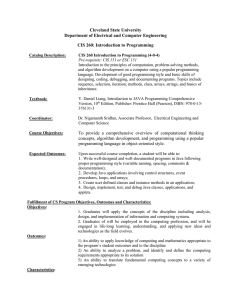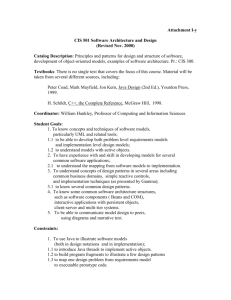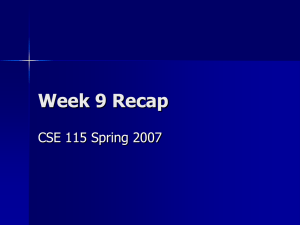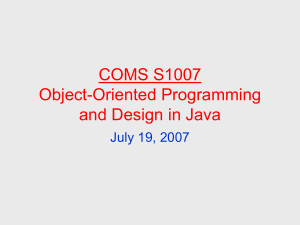Cleveland State University Department of Electrical Engineering and Computer Science CIS 368:
advertisement
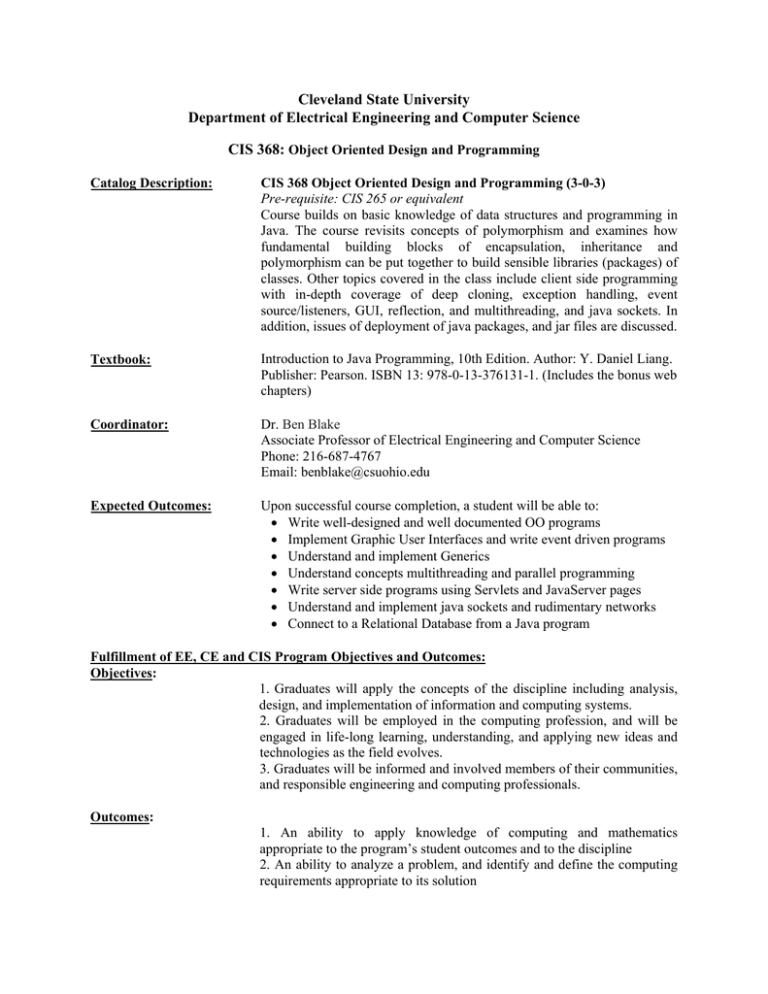
Cleveland State University Department of Electrical Engineering and Computer Science CIS 368: Object Oriented Design and Programming Catalog Description: CIS 368 Object Oriented Design and Programming (3-0-3) Pre-requisite: CIS 265 or equivalent Course builds on basic knowledge of data structures and programming in Java. The course revisits concepts of polymorphism and examines how fundamental building blocks of encapsulation, inheritance and polymorphism can be put together to build sensible libraries (packages) of classes. Other topics covered in the class include client side programming with in-depth coverage of deep cloning, exception handling, event source/listeners, GUI, reflection, and multithreading, and java sockets. In addition, issues of deployment of java packages, and jar files are discussed. Textbook: Introduction to Java Programming, 10th Edition. Author: Y. Daniel Liang. Publisher: Pearson. ISBN 13: 978-0-13-376131-1. (Includes the bonus web chapters) Coordinator: Dr. Ben Blake Associate Professor of Electrical Engineering and Computer Science Phone: 216-687-4767 Email: benblake@csuohio.edu Expected Outcomes: Upon successful course completion, a student will be able to: Write well-designed and well documented OO programs Implement Graphic User Interfaces and write event driven programs Understand and implement Generics Understand concepts multithreading and parallel programming Write server side programs using Servlets and JavaServer pages Understand and implement java sockets and rudimentary networks Connect to a Relational Database from a Java program Fulfillment of EE, CE and CIS Program Objectives and Outcomes: Objectives: 1. Graduates will apply the concepts of the discipline including analysis, design, and implementation of information and computing systems. 2. Graduates will be employed in the computing profession, and will be engaged in life-long learning, understanding, and applying new ideas and technologies as the field evolves. 3. Graduates will be informed and involved members of their communities, and responsible engineering and computing professionals. Outcomes: 1. An ability to apply knowledge of computing and mathematics appropriate to the program’s student outcomes and to the discipline 2. An ability to analyze a problem, and identify and define the computing requirements appropriate to its solution 3. An ability to function effectively on teams to accomplish a common goal 5. An ability to translate fundamental computing concepts to a variety of emerging technologies 6. An ability to apply mathematical foundations, algorithmic principles, and computer science theory in the modeling and design of computer-based systems in a way that demonstrates comprehension of the tradeoffs involved in design choices. 7. An ability to apply design and development principles in the construction of software systems of varying complexity. Student Characteristics: (a) An ability to apply knowledge of computing and mathematics appropriate to the program’s student outcomes and to the discipline (b) An ability to analyze a problem, and identify and define the computing requirements appropriate to its solution (c) An ability to design, implement, and evaluate a computer-based system, process, component, or program to meet desired needs (d) An ability to function effectively on teams to accomplish a common goal (i) An ability to use current techniques, skills, and tools necessary for computing practice. (j) An ability to apply mathematical foundations, algorithmic principles, and computer science theory in the modeling and design of computer-based systems in a way that demonstrates comprehension of the tradeoffs involved in design choices. (k) An ability to apply design and development principles in the construction of software systems of varying complexity. Prerequisites by Topic: Knowledge of programming and Data Structure concepts covered in CIS 260 and CIS 265 Topics: 1. Multidimensional Arrays 2 2. Inheritance and Polymorphism 3 3. Abstract Classes and Interfaces 2 4. JavaFX Basics (Framework, simple UI, event) 2 5. Rest of JavaFX basics 2 6. Event Driven programming 2 7. Java FX UI Controls 2 8. Advanced Java FX 3 9. Binary I/O 3 10. Generics 2 11. Multithreading and Parallel Programming 3 12. Networking 3 13. Java Database Programming 4 14. Java Server Faces 2 15. Servlets 2 16. JavaServer Pages 3 Total sessions Computer Usage: Java, NetBeans 8.0 IDE Editors 40
